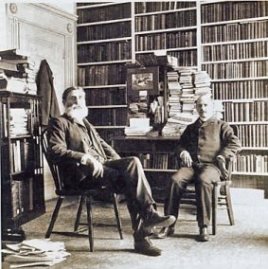Warfield's Inaugural Address on Inspiration and Criticism
Here are a few excerpts from Warfield’s Inaugural Address upon induction as Chair of New Testament Literature and Exegesis at Western [Pittsburgh] Theological Seminary, given on April 20, 1880. This was Warfield’s opening salvo in a career largely dedicated to defending the inspiration and authority of Scripture against all comers—especially critical scholarship.
We risk nothing in declaring that modern biblical criticism has not disproved the authenticity of a single book of our New Testament. It is a most assured result of biblical criticism that every one of the twenty-seven books which now constitute our New Testament is assuredly genuine and authentic.
Warfield notes that critical scholars have a bad habit of eating their intellectual predecessors (metaphorically, of course).
Now, it may well be asked, is that true criticism which starts with the presupposition that the supernatural is impossible, proceeds by a sustained effort to do violence to the facts, and ends by erecting a gigantic historical chimera—overturning all established history—on the appropriate basis of airy nothing? And, is not this a fair picture of the negative criticism of the day? Look at its history,—see its series of wild dreams,—note how each new school has to begin by executing justice on its predecessor. So Paulus goes down before Strauss, Strauss falls before Baur, and Baur before the resistless logic of his own negative successors. Take the grandest of them all,—the acutest critic that ever turned his learning against the Christian Scriptures, and it will require but little searching to discover that Baur has ruthlessly violated every canon of genuine criticism. And if this is true of him, what is to be said of the school of Kuenen which now seems to be in the ascendant? We cannot now follow theories like this into details. But on a basis of a study of those details we can remark without fear of successful contradiction that the history of modern negative, criticism is blotted all over and every page stained black with the proofs of work undertaken with its conclusion already foregone and prosecuted in a spirit that was blind to all adverse evidence. Who does not know, for example, of the sustained attempts made to pack the witness box against the Christian Scriptures?—the wild denials of evidence the most undeniable,—the wilder dragging into court of evidence the most palpably manufactured?
What do the biblical writers themselves say of Scripture? Something ignored by critical scholars due to their anti-supernatural operating assumptions.
If the New Testament, claiming full inspiration, did exhibit such internal characteristics as should set aside this claim, it would not be a trustworthy guide to salvation. But on the contrary, since all the efforts of the enemies of Christianity—eager to discover error by which they might convict the precious word of life of falsehood—have proved utterly vain, the Scriptures stand before us authenticated as from God. They are, then, just what they profess to be; and criticism only secures to them the more firmly the position they claim. Claiming to be verbally inspired, that claim was allowed by the church which received them,—their writers approve themselves sober and honest men, and evince the truth of their claim, by the wonder of their performance. So, then, gathering all that we have attempted to say into one point, we may say that modern biblical criticism has nothing valid to urge against the church doctrine of verbal inspiration, but that on the contrary it puts that doctrine on a new and firmer basis and secures to the church Scriptures which are truly divine. Thus, although nothing has been urged formally as a proof of the doctrine, we have arrived at such results as amount to a proof of it. If the sacred writers clearly claim verbal inspiration and every phenomenon supports that claim, and all critical objections break down by their own weight, how can we escape admitting its truth? What further proof do we need?
To read Warfield’s inaugural address in its entirely, follow this link, Inspiration and Criticism
